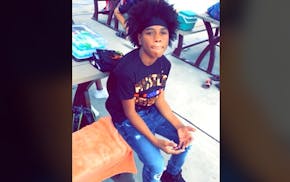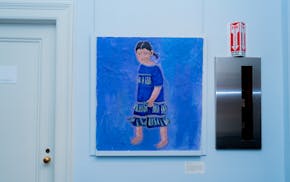What will it take for Minneapolis police leaders to show they're serious about reform?
Minneapolis Police Chief Brian O'Hara recently made an incredible — but unsurprising — misstep when he chose a defensive posture in the face of criticism over his decision to promote a detective to lead a key unit after she'd been admonished for sending a racist email.
"Of the Lieutenants currently available to oversee Homicide, Lt. Aimee Linson is the most qualified," he said in a statement to the Star Tribune about the appointment. "In addition to her ability to interact with individuals in the initial moments of grief after a homicide, she understands complex investigative processes and is well suited to provide leadership for those responsible for the crucial role of homicide investigations. For me to do otherwise would be to underutilize her talents at a time when I am charged with leading the MPD with nearly 40% fewer sworn members."
Linson did not stumble upon an unsavory message and delete it or ignore it. She "forwarded an email chain to several colleagues with the subject line 'Only in the Ghetto,' " per the Star Tribune. That message "contained 16 pictures, seven of which negatively portrayed Black people."
I'm concerned about the appointment of an individual who is now being uplifted as an empathetic soul who is reborn and capable of leading the homicide unit. But the chief's audacity to suggest that he had to promote Linson, who stayed on paid leave for more than a year pending the outcome of an investigation, because of her "talent" highlights the department's stubbornness and brashness when asked to be accountable.
It also shows that racism is, at worst, an inconvenience when you're not Black.
I often get messages from white readers who believe white people have been persecuted due to false accusations of racism in recent years amid "cancel culture." It's not safe for white people to say what they think and feel anymore, they say. Their perceptions are not rooted in experience and truth.
O'Hara's decision to promote Linson is more akin to reality. White people often determine when other white people who've committed racist acts have earned their opportunity for redemption. And, trust me, redemption — not repentance — is always the goal in those scenarios. Linson, who had been a police sergeant at the time, made a choice to send that racist email more than a decade ago. That choice — and the violence that comes with those stereotypes — did not interrupt her career path. She was not canceled.
For years, city and Police Department officials have vowed change in the face of sweeping investigations that have detailed a toxic and discriminatory culture. Federal investigators have cited the Minneapolis department as a unit that has engaged "in a pattern or practice of conduct in violation of the U.S. Constitution and federal law."
The only reason we know about Linson's email is that it was uncovered during the state's investigation of the same Police Department. Linson said she did not remember sending the email.
And she is now the leader of the Minneapolis homicide unit. O'Hara, per his statement, said she will operate with "compassion."
When I was 22 years old, my first job at the Star Tribune involved the coverage of multiple shootings and homicides in Minneapolis. I'd listen to police scanners and arrive at the scene of tragic moments shortly after officers.
Those scenes were somber.
One night, I drove to north Minneapolis, where a young man had been killed in the back seat of a car and pushed onto the street. I still remember the jacket he wore, lifeless, as a crowd gathered.
While I tried to get information about the murder, a car raced to the curb and a woman jumped out.
It was the young man's mother. She had a look of shock on her face that I can still see. I stood there with my tape recorder, knowing I'd just parachuted into the worst moment of her life.
It is fair to question if a police officer who forwarded a racist email is best suited to handle those delicate interactions after shootings and homicides that have cut short the lives of too many Black men and women in the Twin Cities — or if she thinks that's just what happens in "the ghetto."
In his statement, O'Hara said she's qualified for the job. He said he's convinced she's not the same person who sent that racist email because she hasn't acted with bias since then.
He had an opportunity to address backlash from this appointment with the compassion he said Linson will show in her new role. Instead, he said this was the best move for the department. He then blamed the low numbers in the police force, an attempt to shift the conversation from the appointment to his personnel challenges.
But it would be imprudent to believe Linson has changed when it's clear the structure that positioned her to rise in her career after she forwarded that racist email has not.

Medcalf: This summer, let's all be more vigilant about our children — and everyone else's

Medcalf: Mia program provides safe space for young people to create

Medcalf: George Floyd's daughter, now 11, on life without her dad: 'It's hard'


